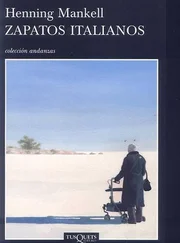'I was born with a ghost for a father,' Deolinda said, and it sounded as if she were spitting out the words. 'Today, now that I'm grown up and smart, I realise that it's true. My father is a ghost, even if he's alive.'
'How old are you?'
She shrugged. 'Eleven. Or fifteen. Or ninety.'
'I think you're twelve,' Nelio said.
'If I'm twelve, then I'll stay twelve for the rest of my life,' she said. 'Why do we always have to exchange one age for another?'
'I've had the same thought,' Nelio said. 'I think I'll go on being ten until I get tired of it. Then I'll be ninety-three.'
Frogs were croaking in the pond of the botanical gardens. Deolinda had several half-rotten bananas in her woven bag which they shared.
After she learned to walk and already had four rainy seasons behind her, Deolinda became aware that she was different. Then, at the very time when she must have needed her more than ever, Deolinda's mother was struck by madness, which not even the renowned curandeiro, sent for from another village, was able to cure. She stopped eating altogether, she refused to braid her hair, and she started wandering around the village with no clothes on. Finally her sister locked her up in a hut and nailed the door shut. They gave her water through the slits in the wall. That was also where she died one night, after having poked out her eyes with a splinter from one of the bamboo poles supporting the roof. The last memory Deolinda had of her mother was of her hands sticking out of the slits in the wall of the hut. As if that was all that was left of her – two empty hands, ceaselessly wringing.
After Deolinda's mother died, her aunt changed. She blamed Deolinda for her sister's death, she frequently beat her, and sometimes she even refused to give her food. Deolinda tried to find out why she had changed, but no one could give her an answer. And so she started to believe that she actually deserved all the blame people placed on her. In her the ancestors had gathered all their misdeeds; they had chosen her to bear them. Deolinda realised that she couldn't stay in the village, and the only person she could think of who might help her was her father. She left the village one night when everyone was asleep, and she never went back. When she arrived in the city and found her father's house near the stinking rubbish dump, he chased her off with a stick and warned her never to come back. After that, the streets of the city were all that remained for her. Many times the nuns took her to an orphanage. But she never stayed more than a few Jays. On the city streets there were others who were as white as she was. Some of them even had cars. They had jobs, and they lived in proper houses. She had discovered, above all, that they also had black children. On the streets of the city she was not alone in being different.
'I'm going to stay alive so that I can have children,' she said. I'm going to have thousands of children, and they're all going to be black. Then, when I can't have any more children, I'm going to kill my father.'
'That's probably not a good idea,' Nelio said. 'If you absolutely have to have him dead, it would be wiser if you asked someone else to do it. I don't think it's good to sit in jail.'
'I want you to teach me how to disappear,' Deolinda said.
'I can't do that,' he said. 'I don't know how I do it myself. Tell me instead why you want to stay with us.'
For a long time she sat in silence. Nelio closed his eyes and dozed on the bench while he waited.
He woke up with a start when Deolinda touched his shoulder.
'You're asleep,' she said.
'I don't like waiting for anything,' Nelio said. 'Instead of waiting, I do something else. Just now I was sleeping.'
'Cosmos is my brother.'
He was astounded. He thought about what she had told him for a while. Could it really be truer?
'He saw the way my father chased me off with a stick. He was still living at home then. Our father started beating him too. He came to the city. He became the leader of the kids sleeping over there on the steps. We would sometimes meet in secret. He said that I could come here after he had set off on his journey. He was the one who taught me to read and write and count.'
'But how could he know that I would take you in?'
'He thought that you would.'
Nelio kept thinking about this strange piece of news.
'Was that why Cosmos set off on his journey?' he asked. 'So that you could come to us?'.
'Maybe.'
'Cosmos ought to be hung on the wall of a church,' Nelio said. 'Not Cosmos himself but his picture. His face carved out of wood, like a saint.'
They left the botanical gardens and crept out through the same hole they had used to get in.
'When I grow up, I'm going to sing for the whole world,' Deolinda said as they made their way through the empty streets.
'Can you sing?'
'Yes,' said Deolinda, 'I can sing. And my voice is very black.'
'Everybody's tongue is red,' Nelio said. 'Just like everybody's blood. There's so much to think about. So much that is strange.'
Deolinda wrapped herself in her blanket next to Mandioca. Tristeza and Mandioca lay on either side of Nascimento, who had crawled into his cardboard box and pulled down the lid. They lay there like two guards, ready if Nascimento should be attacked by the monsters that were always lurking in his dreams. Nelio stared thoughtfully at the ragged band. Then he went to his statue, thinking about what Deolinda had told him. On the way he passed a big hotel where festively dressed people were getting into their cars. He stopped for a moment and stared at all that wealth. Then he continued on his way.
But when he had crawled into the statue and rested his head on the left hind leg of the horse, he couldn't sleep, even though it was late. He started thinking back on the life he had lived in the past, before the bandits had come creeping out of the night and burned his village. He felt as if he were being drawn back in time by an invisible wind. Suddenly the horse's belly was filled with spirits scattering memories over him. He was overwhelmed by a great sorrow – so great that it was almost too heavy for his thin body to bear.
It's dawn. The dry earth is whirling outside the hut. His mother is pounding corn. And she is singing. He wakes up on the reed mat in the darkness of the hut. The smell of burning wood blows in through the opening of the hut. The smell of burning wood, which every morning reminds him that he will live another day. When he goes out into the strong sunlight, he can see that it's all true. His mother, who is pounding the heavy stick against the corn, his newborn sister, who is hanging on her back…
Inside the horse Nelio stood up straight, with his head inside the rider's ribcage. The horse seemed to be alive. He thought that soon he would have to return home. He had to find out what had happened, who was still alive, and who was dead.
The spirits hovering around him had no faces. The whole time he was afraid that he would suddenly recognise the presence of his father or his mother or his sisters and brothers. They would be dead, and it would be even harder for him to go on living life as he did now, which was only surviving.
Nelio would remember the days that followed as the time when he never danced and never smiled. He couldn't hide his gloomy mood, and he saw no reason to try. He was often annoyed at being disturbed all the time – by Nascimento who was always on his way from one fight to the next, and by Tristeza who came each day and asked what he should think about and when he was going to be allowed to buy his trainers. Nelio would lose his temper, and afterwards he would feel even gloomier at the thought that he had done something that was foreign to Cosmos. Deolinda, noticing that Nelio wanted to be left alone, tried to protect him. She chased off the others when she could, and she always saw to it that Nelio had something to eat without having to climb around on the rubbish heaps himself to search for scraps.
Читать дальше












